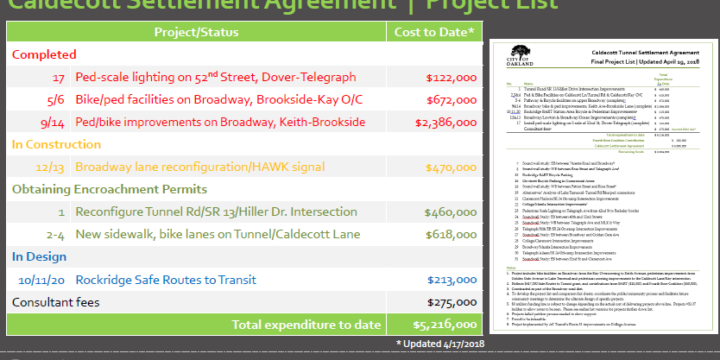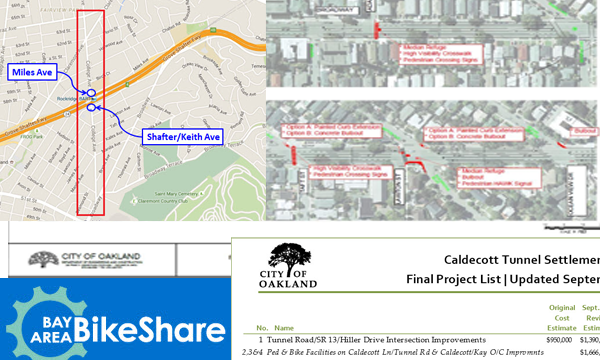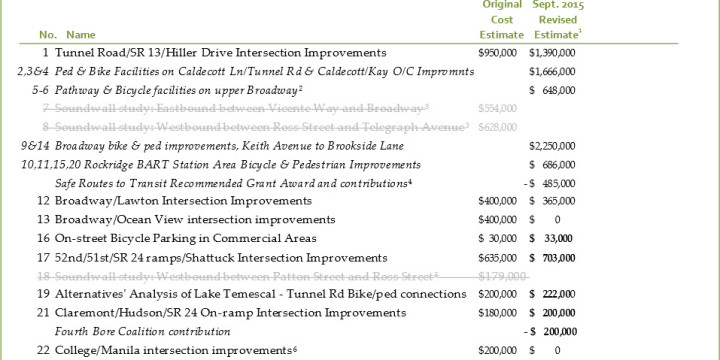Caldecott Lawsuit Settles under Threat from Governor
reprinted from the February 9, 2009 Rockridge News
Governor Schwarzenegger’s demand that the Caldecott Improvement Project – also known as the Caldecott Tunnel Fourth Bore Project – move forward, plus the intervention of the legislature’s Democratic leadership, pressured the Caldecott Tunnel Fourth Bore Coalition (FBC), which includes RCPC among its members, into accepting a settlement of its lawsuit over adding the fourth bore to the tunnel.
Although less than what the FBC hoped for from its suit, the settlement terms are an improvement over what Caltrans had offered during extended discussions last year.
As reported in January’s Rockridge News, the Governor, in the name of providing an “economic stimulus,” proposed a retroactive exemption from the California Environmental Quality Act (CEQA) for the Caldecott project and 10 other highway projects. He stated flatly that he would not sign an amended budget unless it included those exemptions, effectively holding the State budget hostage.
The Democratic legislative leadership, and particularly Senate President Pro Tem Darrell Steinberg, strongly opposed this move. Nevertheless, the FBC was told candidly that, given solid Republican support and other legislators’ fear of being blamed for the State’s insolvency, the CEQA exemption was likely to pass. The result would have been to derail and negate the pending lawsuit (the judge had been expected to issue a decision within weeks) and leave the FBC with nothing to show for its years of efforts.
At the suggestion of Senator Steinberg and California League of Conservation Voters President Tom Adams, FBC leaders and legal counsel met with Caltrans to hammer out a settlement.
The most significant result of the settlement was Caltrans’ commitment to spend $2 million for improvements to State Route (SR) 13, the Ashby Avenue and Tunnel Road corridor, including improvements for some intersections and for pedestrian and bicycle travel. These will help offset traffic increases expected with the new fourth bore.
Caltrans also committed to spend up to $250,000 for a study of the entire SR 24 corridor, from I-580 to I-680. It will consider potential transportation improvements, including High Occupancy Vehicle lanes (HOV) and/or toll lanes, BART and other transit service improvements, current and projected noise levels at the Rockridge BART station platform, and reducing other major impacts of the highway including traffic, noise, and air pollution. However, it provides no funds to implement the study’s results.
Fourth Bore Coalition negotiators were unable to prod Caltrans to do much more to alleviate major construction impacts on those living close to the project. Oakland, in its settlement earlier of a threatened suit, got Caltrans to restrict hauling operations to daylight hours and to limit nighttime noise increases; Caltrans adamantly refused to go any further. However, the highway construction agency did commit, reluctantly, to using low-sulfur diesel for off-road construction equipment. This will help reduce the project’s effect on local air quality. Caltrans also committed to keeping dirt-hauling trucks off local streets and to work with the community to minimize impacts from dirt stockpiling at or near the site.
Caltrans also agreed to fund a barrier along the highway’s edge above FROG Park to protect the park from falling debris, and agreed to consider expanding the park by including unused Caltrans right-of-way land. These agreements will not mitigate the expected noise impacts on the park, but provide some protection and compensation. The agency also committed an additional $100,000 for FROG Park or bicycle transit improvements or to provide additional support for the SR 24 corridor study.
Last, but certainly not least, were several commitments made, not by Caltrans, but by Senator Steinberg and the Democratic Legislative leadership, that promised up to $2 million for noise and air quality mitigation efforts at Chabot Elementary and Claremont Middle schools, as long as the school district provided adequate documentation justifying the expenditures.
Steinberg’s office also promised to work with the East Bay Bicycle Coalition (EBBC) and BART to identify State funds for bicycle transit improvements along the corridor. An unnamed legislator also apparently agreed to carry a bill that could lead to Department of Motor Vehicles (DMV) land along Claremont Avenue being converted to public recreational use once the current building reaches the end of its useful life.
Neither the settlement itself nor the process was what the FBC had hoped for. Still, all in all, especially given the unpleasant circumstances, the settlement provides a small but significant offset to the many impacts the Caldecott project will have on the Oakland/Berkeley community. Perhaps the most unfortunate part of the outcome is what it says about our dysfunctional California political system, and how it was so willing to sacrifice the environment and our community to satisfy special interests.


